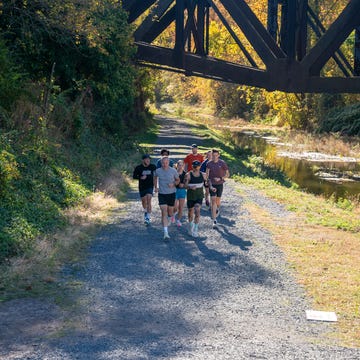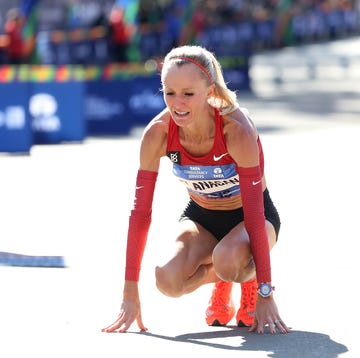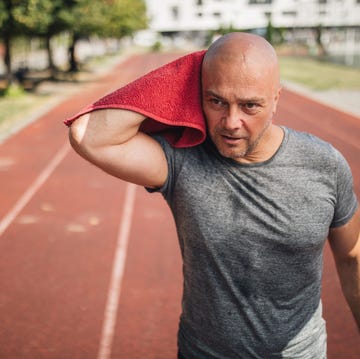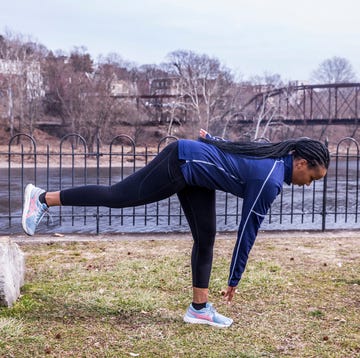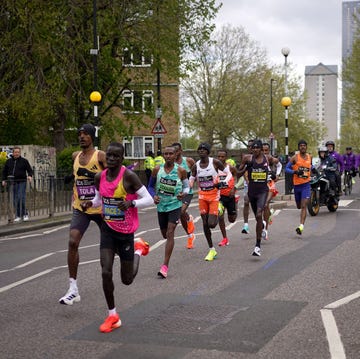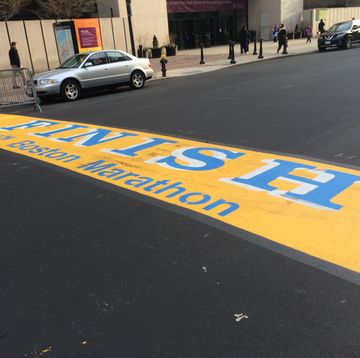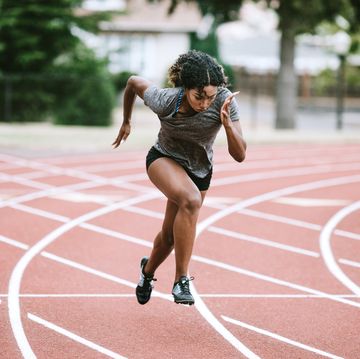A few wisps of dirty blond hair and a primal "OOOOOOW!" emerge from inside Lauren Fleshman's hood. She holds her black sweatshirt above her navel to keep it dry and lowers her legs into the Willamette River's frigid current. It's a cold Friday morning in mid-December. She soaks here year-round, reviving her muscles and watching the geese come and go.
This slab of slimy riverbed is one of the reasons that she and her husband, pro triathlete Jesse Thomas, moved to Springfield, Ore. They live just across the street. Two miles from Pre's Trail, 5K from Hayward Field.
Fleshman has chased athletic dreams from California to Ohio and back again. Success has defined every step of her career--Foot Locker runner-up in high school, three straight NCAA 5,000m championships, and a U.S. 5,000m title--but injury has often followed close behind. She's learned a lot from nine years on the professional circuit. Here in Oregon, a few months before the Olympic trials open downriver in Eugene, Fleshman has finally found herself.
Oregon is the sort of place where the New Age bookstore carries a stack of autographed Kenny Moore books. And where the owner of the local running shoe store can be interrupted by an employee handing him a note: "Call Linda Prefontaine." Steve's sister. A billboard downtown already advertises the upcoming Olympic trials. It's the sort of place where a young Californian with a hippie streak and Olympic dreams can soak her legs and dream big.
In the fall of 1999 Vin Lananna and the Stanford University coaching staff got themselves a demanding freshman. "I needed someone to tell me what to do," Fleshman recalls. "I wanted specifics!" She punctuates the memory with a fist pump. "Most kids are reticent on sharing what they want to do. I remember Lauren being very clear," Lananna tells me. She wanted to be the best. But, he adds, "I don't know if she knew what that meant."
When Fleshman describes her career, she keeps repeating one word: "Professional." Professional runner. Professional coach. Professional team. Both an identity and an ideal, the word puts her career in a certain context. Running is a serious pursuit, worthy of serious attention, it says.
Fleshman graduated from Stanford ready to embrace the Professional life. When Lananna accepted a job in Ohio, she followed. Leaving friends, family and passions behind, she was, she thought, Professional. She diligently recorded her heart rate, sleep, nutrition. Every action received a letter grade. As if the act of documenting by rote would compensate for any shortcomings in performance.
In 2005, while racing in Europe, she noticed that every athlete had a unique approach. The formula that worked for a Paula Radcliffe wouldn't work for a Lauren Fleshman. She just had to figure out what that meant. "In order for me to put my foot down and say, 'I'm doing things my way,' it takes a lot of confidence," Fleshman says. "I didn't have that for a few years. I was still fumbling around trying to figure out what worked for me."
A few hours before Fleshman's dip in the river, I duck under an American flag hanging over the stoop and enter her modest two-story house. A nutty aroma envelops me.
Fleshman, in a gray T-shirt, running tights, and backwards baseball cap, stands over a stainless steel counter in a back room, smooshing a mixture of peanut butter, honey, dried fruits, and nuts into a pan. Fleshman began making Picky Bars as a healthy treat for Thomas. Now they're a full-fledged business threatening to overrun their home and their lives.
After Fleshman and one of her part-time employees cut the sheet into 40 bars, she places each in a tiny plastic bag and seals it with a sticker identifying the flavor: "Lauren's Mega Nuts." Then it's time to run.
"I have a baby, little, tiny, insignificant run today," she says, sourly. Then she pauses, claps her hands, and adds, "I need to be more positive. I'm on my way back!"
In the familiar position of waiting out an injury, she finds herself stuck between the need for patience and the itch to launch her Olympic campaign.
Fleshman's not a woman comfortable sitting still. In 2011, Picky Bars grew rapidly. She also launched a second company, a running journal business, with Irish Olympian Roisin McGettigan. She flooded Twitter and Facebook and wrote for her website. She posed for the cover of Runner's World and ran the media gauntlet of the New York City Marathon. She raced in England and Sweden and Korea. All this sandwiched between an early-season metatarsal stress reaction and an IT band problem that flared up just before the marathon.
In September 2005, craving a team, Fleshman moved to Mammoth Lakes from Ohio and trained with Deena Kastor and company for a year. It wasn't a good fit, so when Lananna headed to Eugene to build the Oregon Track Club Elite program, Fleshman followed again. She loved Oregon, she loved Lananna, and, in fact, she loved an Oregonian: Thomas, a teammate at Stanford, had grown up in Bend.
Fleshman surrounded herself with the people she wanted: her coach, teammates, Thomas. Success followed, but so did pain. Following a 14:58.48 PR in May 2008, a mysterious foot injury prevented her from cooling down. She persisted, and ran the Olympic trials in July, placing fifth, but then a fractured left navicular was diagnosed and a titanium pin was inserted in her foot. She didn't run another 5,000m until 2010.
When Lananna decided to hand over his coaching responsibilities, he asked Fleshman and Nick Symmonds to help choose OTC's next coach. Mark Rowland, the man Lananna eventually hired, first met Fleshman when she gave him a tour of Eugene on crutches. He didn't know if she'd ever run again.
Fleshman didn't know, either. Given month after month to think, she reached a pretty low place. But then, "Everything changed," she says. "It was this light bulb [going off]: 'You will run faster if you're just yourself and stop trying to be someone else.'" She gave herself permission to enjoy life away from the track and to indulge interests other than running faster. The lesson she'd learned in Europe finally paid off. Once her foot healed, Fleshman put her trust in the new coach and began training with a renewed appreciation.
In her second 5,000m race following the injury, Fleshman exploded from the field of the 2010 USATF track championships with 600 meters to go and won her first national title. "Clearly she wasn't the best athlete in that race by a stretch," Rowland says. "Getting her onto the start line is the hardest part, [but] once you get her on the track, she'll probably always maximize her potential."
I asked Rowland what coaching an athlete like Fleshman is like. "Dangerous," he says, without pause. "Hyper-intelligent athletes tend to gather so much knowledge, but that doesn't always get converted into logical programming." The two readily admit they sometimes disagree. They're comfortable with that.
"She's a little bit of a hot potato," Rowland says. "She bounces around." He looks at women's distance running and sees a sport dominated by athletes with a single-minded focus. "[Lauren] won't ever fully, fully achieve her optimal performances," he says. "But don't get me wrong--we can minimize that and tune her in." Rowland calls it "maximizing on the minimum amount of work."
"Maybe it's possible someone could argue that I could run 14:30 if I was more of a monk, but that somebody doesn't know me," Fleshman says. "I think [Vin] always would've preferred that I'd have been more single-track minded.... I wouldn't be surprised if Mark would also prefer that I'd be more single-track minded. But I am who I am."
She tried the obsessive focus, and it made her miserable. Now she runs fewer miles than in college, but makes more of them. She cross-trains and focuses on strengthening exercises. She relies on her chiropractor and embraces massage, acupuncture, yoga, sports psychology and even applied kinesiology. Her holistic approach also leans, heavily, on happiness away from running. With all these pieces in place, she says, "It's almost like I get 10 [times] out of one workout."
Last March, when the stress reaction in her foot had prevented her from running for four months, she told Rowland she wanted to break out of the pattern she seemed stuck in by running the New York City Marathon. Rowland's opinion was unequivocal: "It's just about the stupidest thing she could do if what she wants is to be running the 5K at the Olympics," is Rowland's recollection of his reaction. He talked her into running track last summer, and she talked him into the marathon.
Patience and faith in Rowland paid off. By September, Fleshman had run 15:00.57, her second-fastest 5,000m ever, and made the world championships team. Racing women with PRs well south of the American record, she placed seventh. Nine weeks later she ran 2:37:23 at New York. "I'd like [Fleshman] to have done the training without having actually done the race," Rowland says. "[That was] very beneficial from a physiological perspective. Was it worthwhile? We'll soon find out."
The morning after visiting her at home, I meet Fleshman for a run. On the short drive to Dorris Ranch, a hazelnut orchard near her home, we talk about Ken Kesey. She's reading his novel Sometimes a Great Notion. His lush depictions of Oregon speak to her love of nature.
Fleshman wears a thick wool headband and has a bulky Garmin strapped on her wrist. We start out slowly, jogging past rows of gnarled filbert trees. Their trunks erupt into tangled bouquets of lichen-coated branches, forming tunnels that evoke Middle Earth. She says she's also reading a lot of youth fiction. A publisher saw her website, and contacted her about writing something for adolescents. She'd like to, but isn't sure what--or when--she would write.
Fleshman launched her website in 2009 while her navicular healed. It chronicles her career in painfully personal detail, flourished with outrageous metaphors and a blogger's irreverence. She also interacts at length with her readers. Her human biology major helps her answer their questions: 275 words on avoiding sickness, 480 on navigating puberty, 600 on eating disorders. The conversations continue at length in the comments.
We circle the orchard at a conversational pace, dodging mud puddles and discussing writing. Until recently, writing reminded Fleshman of school work; then she picked up Haruki Murakami's memoir What I Talk About When I Talk About Running and read the first chapter right there, in the middle of a bookstore. "He converted me to writing the way I try to convert people to running," she says. She identified with his passion.
She formulates her posts on the run, turning a topic over in her head until she finds a resolution. When she finally sits down and writes, she doesn't move until completing the piece. "I've had to go out for runs at 7 o'clock at night because I got so engrossed," she tells me later. "I was enjoying that more than I could imagine enjoying a run." These posts provide a raw look into an elite athlete's mind. They also endearingly suggest something she learned from Murakami: There's a shared experience with running, no matter your pace. From the "gremlins" in her calves to a pre-race list of excuses that builds in her head, Fleshman battles the same demons we all do. She just describes them in more colorful detail.
Today's run was supposed to be two 10-minute segments with a short walk in between, part of a gradual progression toward regular training. With 3 minutes remaining, though, she apologizes and asks if we can stop. Her leg has tightened, so we walk back to the car. Her writing addresses a lot of frustration like this. I ask if it serves a therapeutic role. "Definitely," she says quickly. "I looooove over-thinking." The writing helps focus her active mind. Paired with a healthy appreciation for the mental side of the sport, it's become a powerful tool.
Fleshman has a concise definition of Professional. "A commitment to pursuing excellence," she tells me. "That would define a professional, especially in a sport where so many people don't make any money."
She's actually one of the lucky few making a career racing on the track. Nike signed her out of college, and her current deal extends through this year. She sees fewer athletes getting that same opportunity today. "The direction our sport has been going has really screwed a lot of aspiring runners," she says. "Their careers are ending before they should."Symmonds, Fleshman's OTC teammate, has created a campaign to challenge the sport's restrictive sponsorship rules. An incident at the New York City Marathon threw Fleshman into the middle of the fight. Minutes before the start, an official told her that the temporary Picky Bars tattoos she'd rubbed onto her back, shoulder and thigh violated IAAF rules. She tells me later that a representative from the race had told her that she owned her own skin in the marathon. She takes responsibility for the gaffe, however. She'd received the rule-book in advance and missed the line about tattoos. The logos were hastily scrubbed off and she dashed to the starting line.
Despite the incident, which helped Picky Bars sales spike to 7,000 bars a month, Fleshman isn't sure she wants a part in this battle. At 30, with an Olympic Games on the horizon and an uncertain future beyond that, she's focused on her own life. "It's like, 'What can I do that doesn't jeopardize my job?'" she says. "What can I do that doesn't distract me too much from my primary goal?"
A teetering stack of magazines balances on Fleshman's desk in the second-floor office she and Thomas share. She's promised to sign and return them to fans. An electric keyboard sits in the corner. Not much hangs from the walls except a cluster of framed pictures. They all show Fleshman peeking out from under different hoods, making different faces. Serious. Goofy. Aghast. A lot of different Fleshmans look down on us as we talk.
It's several hours after our run. Fleshman and Thomas have just returned from their third holiday party in three days. She slumps in a chair without even taking off her fluffy Santa Claus hat. Given all she reveals on her website, I ask what she holds back.
"People don't realize I'm introverted," she tells me. "I have pretty dramatic emotional swings... exaggerated highs and lows. Not clinically bipolar or something, but I probably am only a few steps away." She laughs. She looks out the door or down toward the floor while she talks. Occasionally her blue-gray eyes swing back into the room and make brief eye contact. "I have big waves of creativity and waves of time when I'm fairly depressed. But then the things I'm capable of during those highs are pretty great."
She's ridden many waves and still questions herself when she descends into one of the troughs. "Is it really worth chasing after these big highs?" she wonders aloud. "Even if I do recover from this, even if I make the Olympics, even if I win a medal, I'm in for a hell of a down after that. It's going to be a doozy!" She lets out another laugh. "Is all of that worth it really?"
She tries holding the Olympic goal at arm's length, but she still views her future in terms of Olympiads: 2012 and, probably, 2016 frame the family she wants to start. She's not holding off on other aspirations, though. I ask how she balances everything. "I don't do it well all the time, to be honest. There's time when I have to drop everything except for running just to reestablish that as the primary objective," she says. "I disappear. I don't know that that's the healthiest way to do things, but that's the only way I can do it sometimes." She's already planning to vanish for the final week of June. The day of the Olympic trials 5,000m final, Fleshman won't wake up in her own bed. She's moving out of the house, away from her businesses and her writing.
While we talk, music filters up through the shag carpet from the garage below. Eventually we walk outside and Fleshman heaves the sliding door open. Thomas is sweating through a 90-minute ride on his stationary trainer. They've converted the dingy space into a crude gym. Rubber mats cover the floor and a suspension training strap dangles from the ceiling. Five bikes hang from hooks on the back wall. Fleshman's two ElliptiGOs sit along another wall. Part bike, part elliptical, they look like nothing so much as gigantic scooters. They're her preferred form of cross-training, and the company now sponsors her. I have to try it, she insists, pulling the green one out and gliding it down to the street.
I give it a skeptical look, so she offers a demonstration. My concern about crashing her ride (and, frankly, myself) turns to fear that I'm abetting the end of her Olympic season before it even begins. But she's already off, cruising down the dark, foggy street, legs spinning beneath her skirt. The white ball on her Santa hat bouncing up and down.
She swings into a wide U-turn and heads back. She'd told me she was depressed the past few weeks, but nothing in her demeanor the past two days betrayed that feeling. Grinning, her cheeks scrunched into rosy balls, she looks lost, absorbed in the fun of the moment. She looks happy.
Marc Chalufour, a former managing editor of Running Times, is now a senior editor of AMC Outdoors. THE ROAD BACK TO THE ROAD TO LONDON
What advice does Lauren Fleshman give runners returning from injury? "Don't be too proud for walk breaks," she says. In mid-December Fleshman began easing back into training after four weeks off. She gradually lengthened her runs and peppered them with 30-second walks. "There's no guarantees you're ready to run," she says. "Here you're being smart and taking little steps."
Fleshman's coach, Mark Rowland, prescribed the runs. He saw a benefit to them even if she was returning from her marathon experience healthy. After the marathon's high volume of steady-state training, he wants her minimizing repetitive strains. "This takes her through the greatest ranges [of motion] without increasing the intensity," he says.
HER FIRST EIGHT DAYS OF RUNNING LOOKED SOMETHING LIKE THIS: (30-second walk break between each segment)
5 x 1:00 (5 total minutes)
SUNDAY
3 x 1:00
1 x 2:00
1 x 1:00 (6 minutes)
MONDAY
1 x 1:00
1 x 2:00
1 x 1:00
1 x 2:00
2 x 1:00 (8 minutes)
TUESDAY
1 x 1:00
1 x 2:00
1 x 1:00
2 x 2:00
2 x 1:00 (10 minutes)
WEDNESDAY
1 x 1:00
1 x 2:00
1 x 3:00
1 x 1:00
1 x 2:00
1 x 3:00 (12 minutes)
THURSDAY
1 x 1:00
1 x 2:00
1 x 3:00
1 x 4:00
1 x 5:00 (15 minutes)
FRIDAY
1 x 10:00
2 x 5:00 (20 minutes)
SATURDAY
2 x 10:00 (20 minutes)
Had she finished the last run pain-free, Fleshman would've graduated to a 20-minute continuous run and done those for a week. In week two, her longest run would've increased to 40-45 minutes. By week three she would've hit an hour on her longest run. "It accelerates pretty quickly if all goes well," she says. That's made possible by a cross-training program that maintains her cardiovascular fitness. Before her return to running, she rode an ElliptiGO for 45-75 minutes, five days a week.
What about that old standby, pool running? "I just really loathe the pool," she admits. "It really ruins my day. I try to do things that actually bring me joy."




